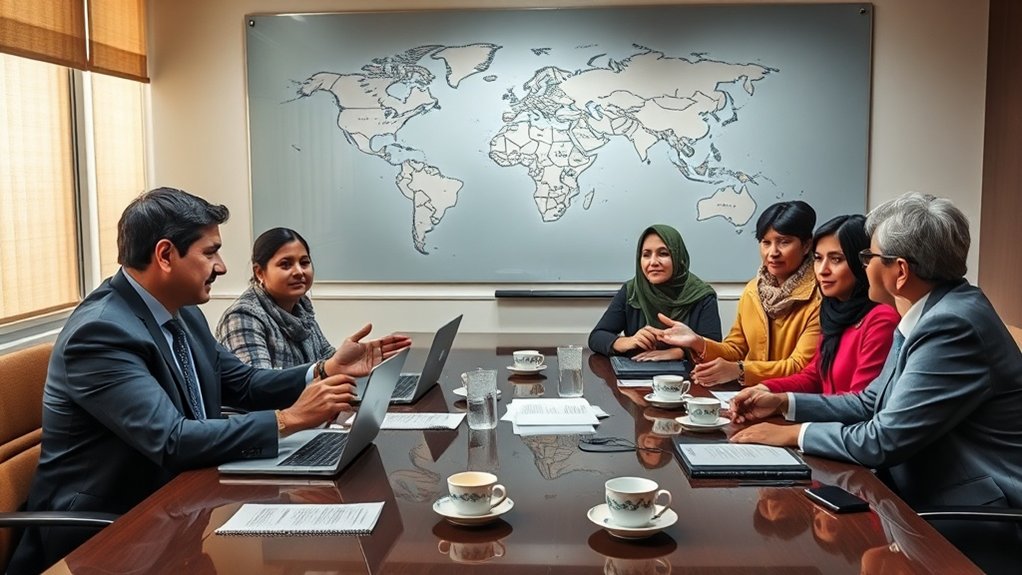If you’re dealing with Afghan asylum cases that involve previous asylum grants in other countries, you know how tangled the legal landscape can get. Vieira Braga Advogados steps in to coordinate these sensitive matters, tailoring their approach to each client’s story and legal hurdles. There’s far more at stake than paperwork, especially with complex international laws involved. You might wonder how real solutions take shape in cases where prior asylum already complicates the path forward.
Overview of Asylum Laws Affecting Afghan Nationals

Although asylum laws protect all individuals fleeing persecution, Afghan nationals face unique legal obstacles shaped by recent history and geopolitical developments. When you seek asylum, you rely on international agreements like the 1951 Refugee Convention. These laws require you to prove a well-founded fear of persecution due to your race, religion, nationality, membership in a particular social group, or political opinion. However, as an Afghan national, you must navigate additional layers of scrutiny. Countries often question the stability of Afghanistan and the risks you face if you return.
Governments assess your individual situation, but they also consider changes in Afghanistan’s political climate, including the impact of the Taliban’s return and evolving diplomatic relations. Documenting your case with country reports and personal evidence becomes especially important. You’re not just establishing past harm—you’re also demonstrating current or future danger, which may shift as international attitudes and local circumstances change. In these complex scenarios, seeking professional guidance significantly increases the likelihood of a positive outcome, as legal experts can help navigate shifting rules and minimize the risk of costly mistakes.
Challenges Faced by Afghans With Prior Asylum Grants
You’ll face tough obstacles if you have a prior asylum grant, especially when it comes to gathering and presenting complex legal documents. Even minor paperwork mistakes can put your new application at serious risk of denial. It’s important to know what’s expected so you don’t jeopardize your case. Seeking help from professionals who have up-to-date knowledge of changing U.S. immigration laws can greatly improve your chances of success and help you avoid critical errors.
Complex Legal Documentation Hurdles
While navigating the U.S. immigration system, Afghans with prior asylum grants often encounter significant obstacles related to complex legal documentation. If you’re in this situation, you’ll need to gather and present paperwork from both your original asylum country and the U.S., making the process feel overwhelming. It’s not just about translations; you must also understand legal nuances and comply with varying document requirements. Failing to submit any required proof can slow or even halt your application. You may face hurdles like:
- Difficulty obtaining certified records from foreign governments or agencies.
- Requirements to show prior asylum status, along with reasons for leaving that country.
- Navigating discrepancies between legal terminology used in different asylum systems.
Professional assistance is particularly crucial, as incorrect documentation can lead not only to application delays but also to denials or deportation.
Risk of Application Denial
Because U.S. immigration authorities closely scrutinize cases involving prior asylum, Afghans with earlier grants face a heightened risk of application denial. If you’ve received asylum in another country, officials may question your need for protection in the U.S. You must prove that your previous status doesn’t guarantee your safety or that circumstances have changed significantly. Missing documents or inconsistencies raise red flags. You also need to address the “firm resettlement bar,” which blocks many applicants with prior marks of safety elsewhere. Understanding these risks—and preparing clear evidence—can make all the difference. Consulting an immigration lawyer with experience in complex immigration laws can substantially increase your chances of approval in these challenging cases.
| Issue | Impact | Required Action |
|---|---|---|
| Prior asylum grant | Heightened scrutiny | Provide context |
| Missing documentation | Risk of denial | Secure all records |
| Inconsistent history | Credibility questioned | Ensure uniform narrative |
| Firm resettlement concern | Possible ineligibility | Argue exceptions clearly |
| Changed circumstances | New review required | Present fresh evidence |
The Role of International and EU Asylum Conventions

As you navigate Afghan cases involving prior asylum, you’ll need to understand how international and EU asylum conventions shape outcomes. The Dublin Regulation, non-refoulement principles, and safe third country rules all play crucial roles in these decisions. Knowing how these frameworks apply will help you anticipate possible challenges and protections. Consulting with legal professionals is essential, as specialized legal assistance ensures efficient navigation through complex and ever-evolving immigration processes.
Dublin Regulation Application
Although many asylum applications from Afghan nationals involve complex histories across multiple countries, the Dublin Regulation provides clear guidelines for determining which EU Member State is responsible for examining each claim. If you’re representing an Afghan national, it’s essential to understand how this regulation impacts your client’s case and shapes the process. The Dublin system relies on factors like entry points, family unity, and prior residency, ensuring streamlined case management within the EU.
- You must identify which country first processed your client’s asylum request, as this typically dictates responsibility.
- Pay attention to fingerprints and travel documentation since these often influence the Dublin decision.
- Prioritize communication with relevant national authorities to clarify which country assumes responsibility.
Working with an immigration lawyer can ensure that you meet all legal requirements and deadlines, significantly improving the chances of a successful case outcome. Knowing these fundamentals lets you navigate the Dublin Regulation and advocate effectively for Afghan clients.
Non-Refoulement Principles
Even when Afghan asylum cases involve previous applications or transfers under the Dublin Regulation, you must keep the principle of non-refoulement at the forefront. This core concept, embedded in both international law and EU asylum conventions, prohibits you from returning someone to a country where their life or freedom would be threatened. Non-refoulement applies regardless of prior asylum claims or procedural complexities. You’re tasked with assessing current risks in Afghanistan and ensuring compliance with instruments like the 1951 Refugee Convention and Article 3 of the European Convention on Human Rights. These obligations override administrative convenience; you can’t send an applicant back into harm’s way. Ultimately, upholding non-refoulement safeguards fundamental rights and reinforces the integrity of asylum protection across Europe. In certain instances, adjustment of status may also provide a lawful pathway for Afghan refugees to obtain more secure residency, strengthening their protection against return.
Safe Third Country
When handling Afghan asylum cases, you’ll often encounter the “safe third country” concept, a key filter under both international standards and EU law. This principle means you must assess whether your client already found safety in another state before reaching the current country. In the EU, the Dublin Regulation shapes these determinations, aiming to prevent “asylum shopping” while ensuring responsibility is shared. Internationally, the 1951 Refugee Convention and its Protocol guide who holds protection duties.
You need to closely evaluate:
- Whether the third country actually offers effective protection and respects human rights.
- The applicant’s connection to the third country, if any.
- Risks of indirect refoulement, should return be ordered.
Careful scrutiny is essential to secure fair processes and safeguard genuine refugee rights. Working with lawyers who understand the complexity and constant updates in immigration laws can help ensure no crucial aspect of the applicant’s journey is overlooked.
Common Legal Obstacles in Cross-Jurisdictional Cases

Since Afghan cases often span multiple countries and legal systems, navigating cross-jurisdictional challenges becomes complex for applicants and their advocates. You’ll frequently face inconsistent legal standards, as each country applies its own definition of refugee status, safe third country, and evidence requirements. Gathering documentation from multiple jurisdictions can delay proceedings, while language barriers may further complicate communication with officials abroad.
Data-sharing between countries isn’t always seamless. Limited cooperation or outright refusal to provide critical information may hinder your ability to establish the applicant’s history and needs. Additionally, conflicting deadlines and procedural requirements between jurisdictions can create traps for the unwary—missing one step might jeopardize the case elsewhere.
You must also stay alert to differences in legal representation: some countries grant more or less access to counsel, making coordinated strategy challenging. Ultimately, these legal obstacles require careful planning, proactive document collection, and creative problem-solving to ensure your client’s protection and legal rights aren’t compromised.
Working with an immigration lawyer is especially critical in these situations, as their expertise in legislation and personalized support can significantly increase your client’s chances of success.
How Previous Asylum Granted Impacts New Applications
Although having already received asylum somewhere else might seem like an advantage, prior grants can complicate any new application you submit. When you apply for asylum in a new country, authorities will look closely at your existing protection and question your motivations. They’ll want to know why you’re seeking fresh protection if another country already deems you safe.
You’ll face extra scrutiny because countries often coordinate and share information. This can result in delays, requests for additional documents, or even outright rejections. Here’s what you need to consider:
- Your new host country might argue that your previous asylum status should provide you adequate protection, making your current claim inadmissible.
- Officials may suspect you’re “asylum shopping,” which could undermine your credibility during the procedure.
- The legal agreements between countries—like the Dublin Regulation—could result in your transfer back to the country that first granted you asylum.
It’s especially important to work with experienced immigration lawyers to navigate these challenges, avoid common pitfalls, and ensure that your rights are protected throughout the process.
Understanding these hurdles is vital for a successful application.
Step-by-Step Process for Afghan Asylum Seekers in Portugal

Navigating multiple asylum claims comes with unique obstacles, but you still have a clear process to follow if you’re seeking protection in Portugal. First, you’ll submit your application in person at the Serviço de Estrangeiros e Fronteiras (SEF), either at the border or within Portuguese territory. You’ll provide documents, a detailed account of your journey, and state any previous asylum grants elsewhere.
Next, SEF reviews your information and checks European databases for previous asylum activity. If Portugal finds itself responsible for your claim, you’ll receive an interview invitation. During your interview, you’ll explain your circumstances and why you can’t return to Afghanistan or the country that previously granted asylum.
Following the interview, SEF evaluates your claim and issues a decision. If your application’s denied, you have the right to appeal in court. Throughout all steps, accuracy and timely responses improve your chances for a positive outcome.
Strategies Employed by Vieira Braga Advogados for Complex Cases
When you’re facing a complex asylum case—especially with a history of prior asylum in another country—Vieira Braga Advogados draws on specialized strategies to strengthen your application. Their team understands that your situation isn’t straightforward; so, they work methodically to build a compelling, well-documented case. They know the nuances of international asylum law and anticipate the unique obstacles you might encounter in Portugal.
You’ll experience a client-focused approach where your individual story is at the center of their planning. To maximize your chances of success, they prioritize:
- Detailed evidence gathering: They collect and organize credible documents and testimonials to support every aspect of your claim.
- Legal argument customization: They tailor legal arguments to address inconsistencies or prior decisions from other jurisdictions.
- Strategic timing and communication: They pinpoint the best moments to present information and ensure clarity in all communications with Portuguese authorities.
This methodical, client-centered approach consistently delivers robust advocacy.
Collaborations With International and Local Organizations

Building a strong asylum case often means reaching beyond legal expertise to leverage key relationships. You’ll find that Vieira Braga Advogados understands the crucial role collaborations play when handling Afghan cases with prior asylum attempts in other countries. Working with international NGOs, human rights agencies, and local community groups lets you access essential documentation, gather background evidence, and support clients holistically. Collaborations also ensure you’re updated on shifting legal standards and humanitarian conditions, strengthening your advocacy.
Here’s how these partnerships function:
| Type of Organization | Contribution | Example Collaborator |
|---|---|---|
| International NGO | Country condition reports | Amnesty International |
| Local Community Group | Cultural and translation support | Afghan associations |
| Human Rights Agency | Legal updates and alerts | UNHCR |
| Professional Legal Network | Document authentication, referrals | Bar associations |
Personalizing Legal Support for Afghan Clients
You need to approach each Afghan client with culturally sensitive communication that respects their background. Adjust your asylum application guidance to fit their unique experiences and circumstances. This personalized support increases trust and improves case outcomes.
Culturally Sensitive Communication Strategies
Although Afghan clients arrive with diverse backgrounds and experiences, effective legal support always hinges on communication that respects their culture and values. You must approach every interaction with genuine curiosity and openness, recognizing unique beliefs, traditions, and sensitivities. Building trust starts with active listening, letting clients share their stories without fear or judgment. Being mindful of language barriers or emotional distress is crucial; never assume familiarity with Western legal concepts or processes. Instead, adapt your communication style and engage interpreters or cultural mediators when needed. Consider these strategies:
- Recognize nonverbal cues, as gestures or silence may carry significant meaning in Afghan culture.
- Prioritize confidentiality, addressing concerns about privacy and family safety.
- Allow time for clients to express themselves fully, even if it challenges standard procedures.
Tailored Asylum Application Guidance
While each Afghan client’s journey is distinct, tailoring your asylum guidance starts with a careful review of their personal history, prior asylum attempts, and any changes in country conditions. You’ll need to gather every detail—whether it’s documentation from past cases or updates on family safety—to present their case accurately. By identifying specific vulnerabilities and challenges, you can customize your legal approach to maximize their chances.
Here’s a quick guide to personalizing support:
| Key Consideration | Action Step |
|---|---|
| Personal History | Conduct detailed interviews |
| Previous Asylum Attempts | Analyze rulings and reasons for rejection |
| Country Conditions | Research changes since last application |
| Vulnerabilities | Highlight issues like trauma or risk |
| Evidence Documentation | Gather supporting records and testimonies |
This structure ensures no critical detail gets overlooked.
Success Stories and Key Achievements by the Practice

Because the practice has handled numerous challenging Afghan asylum cases, it’s garnered significant successes that highlight both expertise and dedication. You’ll find that Vieira Braga Advogados has consistently achieved favorable outcomes, even in complicated scenarios where clients had prior asylum claims in other countries. Their proactive strategies and sharp legal insight make a tangible difference for individuals facing uncertain futures.
You benefit from a legal team that doesn’t just react—they anticipate obstacles and develop clear, effective solutions. Here are key achievements that set the practice apart:
- Secured successful re-adjudication of asylum applications for clients previously denied in multiple jurisdictions.
- Facilitated family reunification in sensitive cases despite complex international legal barriers.
- Negotiated directly with immigration authorities to prevent deportation and ensure client safety.
With these achievements, you gain confidence knowing your case is in capable hands, and that resilience and specialization back every decision made on your behalf.
Frequently Asked Questions
What Is the Average Cost of Legal Representation for Afghan Asylum Cases?
You’ll typically pay between $2,000 and $10,000 for legal representation in Afghan asylum cases, depending on complexity, location, and your lawyer’s experience. Some lawyers charge flat fees, while others bill hourly. Remember, more complicated cases or appeals may cost more. Always ask your potential lawyer for a detailed estimate, and check if you qualify for pro bono legal aid or low-cost legal clinics. Don’t hesitate to negotiate payment plans if needed.
How Long Does It Typically Take to Resolve These Asylum Cases?
You’ll usually find that resolving these asylum cases takes anywhere from several months to a few years. It depends on factors like the complexity of your situation, the country where you’re applying, how quickly authorities process the paperwork, and whether you need appeals or additional interviews. You should prepare for delays, since international coordination and background checks can slow things down. Staying proactive with your lawyer can help you navigate the process efficiently.
Are Translation Services Available Throughout the Asylum Process?
Yes, you can access translation services throughout the entire asylum process. From your initial interview to any subsequent hearings or document submissions, translators help ensure you understand every step and can communicate your case clearly. Authorities usually arrange interpreters for your preferred language, so don’t hesitate to request support if you’re uncomfortable with the language used. Effective communication is crucial, and you’re entitled to this assistance at every stage.
What Documents Are Needed During the Initial Legal Consultation?
For your initial legal consultation, you’ll need to bring your passport or ID, any visas you hold, and documents relating to your travel history. Don’t forget any asylum paperwork, previous legal decisions, and correspondence from immigration authorities. It’s also helpful to provide proof of address and personal identification for your family members if applicable. Preparing these documents helps your lawyer understand your case faster and give you the most accurate advice possible.
Can Family Members Join an Approved Afghan Asylum Seeker in Portugal?
Yes, once you’re approved as an Afghan asylum seeker in Portugal, your close family members—like your spouse and minor children—can usually apply to join you under family reunification rules. You’ll need to submit applications for them, proving your relationship and your refugee status. Keep your documents ready, like marriage or birth certificates, to speed up the process. Don’t delay, as timely applications can help your family reunite faster.
Conclusion
When you’re facing the challenges of seeking asylum after a prior grant in another country, you need meticulous, personalized legal support. Vieira Braga Advogados steps in to coordinate every detail, ensuring your unique story is heard and all evidence is airtight. By working closely with international partners and using deep expertise in asylum law, they maximize your chances for success. Trusting their team means you’re not alone in navigating these complex legal waters—they’re with you every step.






